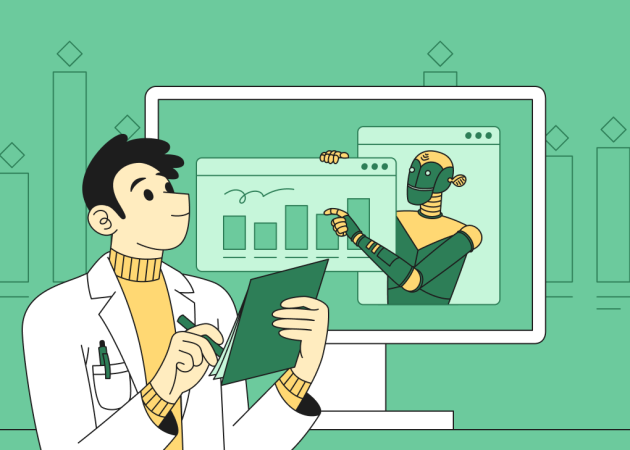
How to Build an AI Team: Balancing Technical Skills with Emotional Intelligence
Contents
Contents
In our rapidly digitized world, artificial intelligence teams stand out as a transformative force, driving change across industries. While the focus is often on the technology’s prowess, a misconception thrives: AI development is solely a technical endeavor. In truth, the human touch, particularly soft skills and AI, plays a paramount role in making AI genuinely effective.
The Evolution of the AI Tech Role: From Coders to a Team of AI Experts
The era when AI developers were solely focused on programming is long gone. Nowadays, their role has expanded to encompass a variety of tasks and responsibilities. This shift reflects a harmonious blend of human insight and machine accuracy, a combination that is essential for groundbreaking AI advancements.
AI-assisted development is commonly used today in areas like code development, automated testing, and vulnerability detection. A recent study by Nngroup found that programmers who used AI for coding tasks could complete 126% more projects per week. Support agents using AI tools could handle almost 14% more customer inquiries per hour, while other professionals could write 59% more business documents per hour, which is a remarkable efficiency improvement.
These results raise the bar for today’s AI professionals, who are expected to grasp not only the technical dimensions of AI but also the business challenges they aim to address. Moreover, they are increasingly collaborating with other key players like business executives and data scientists to optimize the application of AI.
Why Soft Skills Matter in a High-Performing AI Team
Soft skills aren’t just the “nice-to-haves”; they are essentials. They foster collaboration and encourage a deeper understanding of the human elements AI serves. With soft skills, the bridge between technical development and human-centered application is fortified, making it easier for a successful AI team to explain AI concepts to non-technical stakeholders.
Key Soft Skills to Cultivate in an AI Team
- Empathy for user-centric solutions: Understanding end-user needs and concerns is essential for creating AI solutions that are truly user-centric.
- Adaptability in a changing landscape: The AI field is constantly evolving. The ability to adapt to new technologies and methodologies is crucial for staying ahead.
- Holistic problem-solving: It’s not just about fixing code; it’s about understanding the bigger picture and finding solutions that address all aspects of a challenge.
- Creativity as a catalyst for innovation: In a field ripe for innovation like AI, creativity is not just a bonus; it’s a necessity for pushing boundaries.
- Clear communication for complex topics: AI is a complicated field. The ability to simplify complex topics for diverse audiences is invaluable.

The Link between Soft Skills and Enhanced AI Solutions
Soft skills do more than just facilitate smoother interactions within the team; they directly contribute to the quality of AI solutions. For instance, empathy helps developers design algorithms that are more attuned to user needs, while strong communication skills can translate into better documentation and user guides, making the technology more accessible to the general public. Adaptability ensures that the team can quickly pivot in response to new information or challenges, leading to more robust and flexible solutions. Creativity opens the door to innovative approaches and techniques, pushing the boundaries of what AI can achieve. In essence, soft skills enrich the technical aspects of AI development, leading to solutions that are not only technically sound but also deeply resonant with the people they serve.
The Value of Continuous Learning and Upskilling
Continuous learning serves as a fundamental pillar for creating AI teams that are prepared for the future. L&D powering the AI future isn’t a loud overstatement: a recent LinkedIn Workplace Learning Report reveals that 4 in 5 employees want to learn more about using AI in their profession, with 90% of organizations viewing learning opportunities as a No.1 priority in employee retention strategies.
For AI teams, this means upskilling not just in emerging technologies like deep learning or natural language processing but also in soft skills and cross-disciplinary knowledge. Personal career growth, through learning and skill development, spurs company growth. Combined with business innovation, this growth, in turn, energizes and inspires people to grow more professionally.
An IBM The Value of Training study highlights the ROI of skill development for organizations. Having looked at best and worst performing companies to see how skills impact performance, analysts found that 84% of employees in the “best performing” category received the training needed for their role — 68% better than “worst performers.” Moreover, skill levels linked to business value brought $70,000 in annual savings and a 10% productivity increase when teams were trained well. Investment in training and skill-building culture directly impacts team retention: 62% of new hires intend to stay in the company when it provides training.
These statistics underscore the tangible benefits of fostering a learning culture. Providing AI teams with access to training programs, certifications, and collaborative learning opportunities ensures they remain agile and prepared to tackle tomorrow’s challenges.
Strategies to Promote Lifelong Learning in AI Teams
- Integrate learning into daily workflows: Use microlearning platforms or provide quick-access resources to encourage continuous skill development.
- Foster peer-to-peer learning: Encourage team members to share knowledge through workshops, hackathons, or mentorship programs.
- Invest in external training and certifications: Partner with recognized institutions or platforms to provide top-tier educational opportunities.
- Encourage exploration of adjacent fields: Promote understanding of domains like business strategy, ethics, or human-computer interaction to complement technical skills.

How to Build an AI Team: Strategies to Cultivate Soft Skills
Nurturing these skills isn’t just about occasional workshops. It demands a systemic approach:
- Soft skill training: Make it part of your regular team development sessions.
- Cross-disciplinary collaborations: Forge connections with other departments. An AI professional’s collaboration with marketing or sales can provide fresh perspectives.
- Role-playing and scenario-based challenges: Such engagements help teams envision real-world applications and challenges.
- Feedback and open dialogue: Encourage a culture where feedback isn’t just provided but cherished.
The Role of Team Sustainability in Successful Tech Product Development
Success in tech product development isn’t just about the sprint — it’s about the marathon. A team’s sustainability plays a pivotal role in ensuring consistent and innovative output.
Strategies Employed by Beetroot for Long-Term Productivity and Team Health
At Beetroot, sustainability isn’t just a buzzword — it’s ingrained in our ethos. Recognizing and proactively addressing signs of team fatigue isn’t just responsible; it’s imperative. Our approach to building sustainable teams includes the following:
Drive a healthy workplace culture
At Beetroot, we go beyond the conventional notion of work-life balance and focus on creating a harmonious work environment. We encourage team members to bring their whole selves to work, optimizing their workflow and contributing their broader skillsets to projects. Our value code reflects this as “wholeness,” emphasizing the importance of a balanced state of mind and passionate productivity.
Ideas to consider:
- Master a positive feedback culture
- Encourage physical exercise and breaks
- Lead by example and enhance support for parents

Be mindful of mental health
We prioritize mental well-being to prevent team burnout and ensure long-term productivity. Our efforts include providing access to qualified mental health therapists, hosting awareness meetings, and encouraging open conversations about mental health.
Ideas to consider:
- Survey your team about mental health
- Provide access to meditation apps and mental health resources
Communicate the purpose
Inspired employees are more productive and effective. We make it a point to articulate the broader impact of our projects and how each team member contributes, providing a long-term context that fuels passion and engagement.
Beetroot Essentials
- Mental health efforts: We strive to create a secure and healthy work environment across our development locations.
- Social engagement: We engage with local initiatives and encourage team members to initiate awareness projects or charity causes.
- Environmental engagement: Beetroot is a CO2-neutral company, committed to reducing our carbon footprint and promoting eco-awareness.
By thinking sustainably in how teams are built, we’ve found that collaborations with a mutual sustainability mindset have been the most successful for all involved parties. We encourage you to be mindful of team longevity and the ripple effects of quality software engineering, especially when working with remote developers.
Future-Forward: The AI Team of Tomorrow
The narrative of AI isn’t just about algorithms — it’s about the human minds behind them. By valuing and nurturing soft skills, we pave the way for AI solutions that resonate, inspire, and genuinely make a difference.
If you’re looking to build a team that not only excels in machine learning and data science but also embodies the essential soft skills for success, look no further. At Beetroot, we specialize in assembling expert ML and Data teams tailored to your needs. Reach out to us today to discover how we can help you achieve your AI ambitions.
Subscribe to blog updates
Get the best new articles in your inbox. Get the lastest content first.
Recent articles from our magazine
Contact Us
Find out how we can help extend your tech team for sustainable growth.






